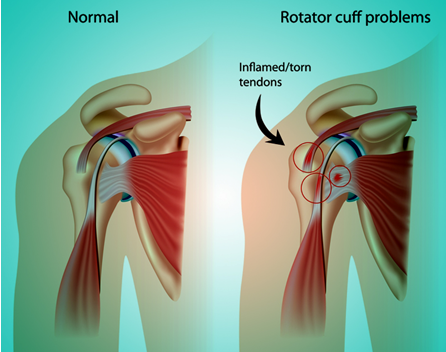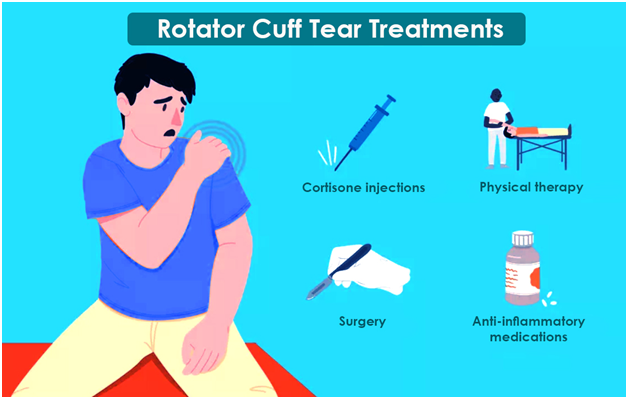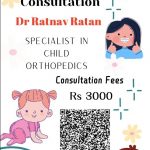Rotator Cuff Tears Treatment in Gurgaon,Delhi

Rotator Cuff Tears occur in the shoulder area. They occur as a result of chronic impingement of the rotator cuff muscles. This impingement causes inflammation and tearing in the shoulder area.
These tears can also occur to sportspeople who are active in playing sports that require use of the overhead arm action or likely to fall frequently when playing. Also, its risk increases in individuals above 40 years of age especially when they play active sports.
If you are from Gurgaon or a nearby area, a visit to an orthopedist in Gurgaon such as Dr. Ratnav Ratan becomes essential if there is persistent pain in the shoulder accompanied by weakness and unable to comfortably perform normal activities. Dr. Ratnav is an experienced Pediatric Orthopedic and Sports Medicine Surgeon in Gurgaon well-known for treating rotator cuff tears.
Now let us know more about the rotator cuff tears.
Anatomy of the Rotator Cuff Tear
The arm is firmly secured in the shoulder the rotator cuff which in turn is a group of four muscles which form a covering around the head of the upper arm bone. These four muscles are referred to as tendons. In between the tendons and top of the shoulder, there is a lubricating sac called a ‘Bursa’ which gets affected due to the tears in the rotator cuff tendons leading to pain and discomfort. It may so happen that the tendon tears away from the bone.

Symptoms of Rotator Cuff Tear
Most patients with rotator cuff tear in Gurgaon, Delhi complain of
- Pain in the affected shoulder on lying down at night or when resting
- Pain during specific arm movements especially lowering and lifting of arms
- Weakness when rotating or lifting the arm
- Crackling sensation when the shoulder is moved in certain positions
- The pain may radiate to the elbow though the location of pain varies from time to time
There are two types of rotator cuff tear, viz. –
Acute rotator cuff tear
This type of rotator cuff tear happens instantly for e.g. fall on the outstretched arm or lifting a heavy object with a jerk. An acute rotator cuff tear can occur with other shoulder related injuries such as dislocated shoulder or broken collarbone.
Degenerative Tear
Age-related wearing down of the rotator cuff tendon is a gradual process. It usually happens in the dominant arm with an equally high chance of the tear occurring in the shoulder. Degenerative rotator cuff tears are also referred to as chronic tears. The reasons for their occurrence are repetitive stress on account of playing sports or doing routine chores, bone spurs and reduced blood supply.
Orthopedic Evaluation and Diagnosis
The orthopedic surgeon will understand the medical condition of the patient along with his or her medical history along with a physical examination of the shoulder. The doctor will measure the range of motion of the shoulder, the neck area and the arm strength for accurate diagnosis.
If required, x-rays and MRIs will have to be performed to assess the tear and the extent of wear and tear in the rotator cuff area. The orthopedic surgeon will be able to decide on how to treat the rotator cuff tear comprehensively in Gurgaon Delhi.
Treating rotator cuff tear
Apart from the accurate diagnosis of the tear, the orthopedic surgeon will consider the patient’s medical history, age, activity levels before suggesting how to treat the rotator cuff tear in Gurgaon, Delhi. The orthopedic surgeon will focus on restoring the function of the rotator cuff along with reduction in pain.
The treatment options are

Nonsurgical treatments
The surgeon will recommend management of rotator cuff tears with physical therapy if the tear is in the initial stage. Yes, the patient can show improvements in movements along with pain relief. Here, the general orthopedic advice includes –
- Rest and less activities relating to the use of the shoulder
- Use of sling to maintain the shoulder in position and give the essential support.
- Avoid activities that cause pain to the shoulder.
- Nonsteroidal anti-inflammatory medication for relief from pain and inflammation. At times, the surgeon suggests steroid injection for better results.
- Physical therapy and shoulder strengthening exercises.
Surgical Treatment
If there is no improvement in the pain after nonsurgical treatment, then options in surgical treatment are –
- Open Repair – Open surgery requires an incision of nearly 7 cms in length to check the damage and repair a large or complex tear. The surgeon removes the bone spurs and perform a tendon transfer, if required.
- All-Arthroscopic Repair – All-arthroscopic repair is the least invasive procedure to repair the torn rotator cuff. It is an outpatient procedure. The surgeon makes small incisions to repair which is done using miniature surgical instruments.
- Mini-Open Repair – Mini-open repair is done using arthroscopy to assess and repair the damage in the shoulder joint. Here, the surgeon makes a relatively small incision of 3 – 5 cms in length. Bone spurs are removed arthroscopically without detaching the deltoid muscle. In case of tendon repair, the surgeon can view and repair the shoulder structures directly through arthroscopy.
Frequently asked Questions
The surgeon will recommend surgery to heal the shoulder rotator cuff tear if,
- The patient is suffering from the tear for past 6 to 12 months
- The tear is more than three centimeters in length and the surrounding tissue is in good condition
- The shoulder has weakened along with loss of function
No, in general most of the surgical repairs are performed as outpatient procedures so hospital stay is not necessary. The surgeon will be the best person to decide on the surgical repair procedure and approach to treat other related shoulder issues, if any.
It will take nearly 12 months for the sportsperson to return to active sports.
Initially, the sportsperson will have to take ample rest along with pain relief medication. The repaired shoulder may have to be placed in a sling for maximum support and fast recovery.
Only after 4 – 6 weeks of the surgery, the sportsperson will be given a physical therapy protocol to follow. There will be a gradual increase in the intensity of the physical therapy exercises with the passage of time.
So, it may take anywhere between 6 – 12 months or more for full recovery from the rotator cuff tear. Here again, the personal health condition of the patient determines the rate and period of recovery.
It is essential to learn and develop proper techniques when using overhead arm action when playing active sports. It is advisable to avoid overhead activities on a repetitive basis as much as possible.




